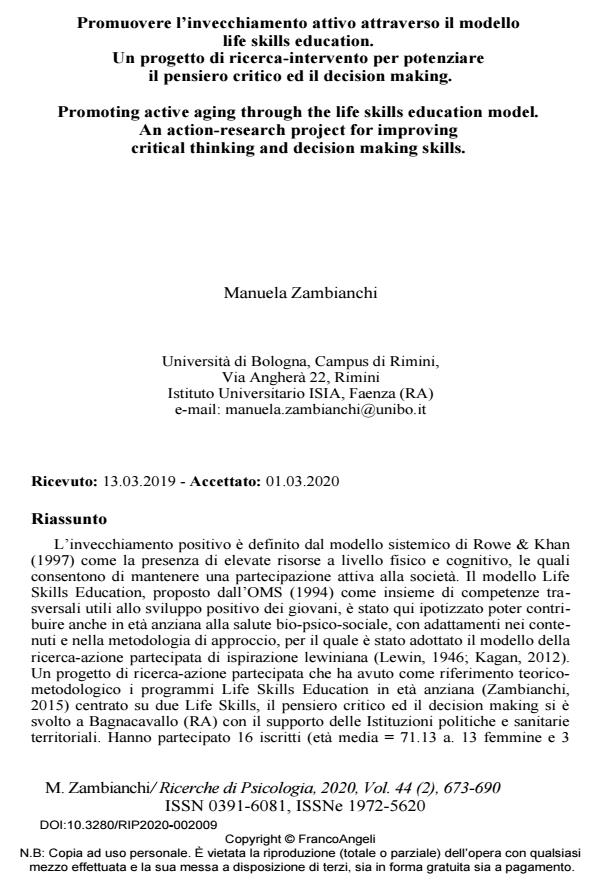Promoting active aging through the life skills education model. An action-research project for improving critical thinking and decision making skills
Journal title RICERCHE DI PSICOLOGIA
Author/s Manuela Zambianchi
Publishing Year 2020 Issue 2020/2
Language Italian Pages 22 P. 651-672 File size 340 KB
DOI 10.3280/RIP2020-002009
DOI is like a bar code for intellectual property: to have more infomation
click here
Below, you can see the article first page
If you want to buy this article in PDF format, you can do it, following the instructions to buy download credits

FrancoAngeli is member of Publishers International Linking Association, Inc (PILA), a not-for-profit association which run the CrossRef service enabling links to and from online scholarly content.
Positive aging has been defined by the Rowe & Khan’ systemic model as the presence of high level of physical and cognitive resources, that allow the mainte-nance of an active participation to the society of the elderly. The Life Skills Edu-cation Model, proposed by WHO (1994) as a set of transversal skills effective for positive development of young people, was here hypothesized as able to contrib-ute, also in old age, to the global bio-psycho-social health. It was modified for its contents and for intervention methodology, adopting the participation-action re-search model, inspired to the lewinian approach (Lewin, 1946; Kagan, 2012). A participated action-research project theoretically referred to this Life Skills Edu-cations programs adapted for old age (Zambianchi, 2015) and focused on critical thinking and decision making, was conducted at Bagnacavallo (RA), with the support of local political and health Institutions. 16 subjects participated (m. age: 71.13; 13 females and 3 men) and filled in the input and output questionnaire on social representation of health, two item on the beliefs about Mediterranean diet and physical activity as health- promoting factors, and on the decision making styles. After the training course, repeated measure Manovas highlighted signifi-cant changes on social representations on health, beliefs about healthy behaviors and on decision making styles, with the increasing in rational-planning decision making style.
Keywords: Positive aging, Life Skills, critical thinking, decision making
Manuela Zambianchi, Promuovere l’invecchiamento attivo attraverso il modello life skills education. Un progetto di ricerca-intervento per potenziare il pensiero critico ed il decision making. in "RICERCHE DI PSICOLOGIA " 2/2020, pp 651-672, DOI: 10.3280/RIP2020-002009